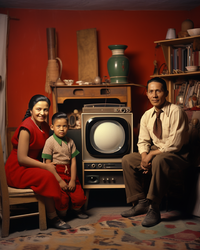The Tube: Difference between revisions
(Created page with "{{Nouvelle Alexandrie Article}}{{Infobox Term | name = El Tubo / Le Tube | image = WechuaFamilyTV.png | caption = A Wechua family in {{AN|1556}} around their new TV. | meaning = The Tube<br>Refers to a television or a device with a screen for videos. | origin = {{team flag|Wechua|flag}} Rimarima, Wechua Nation | introduction_year = c. {{AN|1553}}, not precise | language = }}'''The Tube''', also known as '''El Tubo''' (Martino), '...") |
No edit summary |
||
| Line 6: | Line 6: | ||
| origin = {{team flag|Wechua|flag}} [[Rimarima]], [[Wechua Nation]] | | origin = {{team flag|Wechua|flag}} [[Rimarima]], [[Wechua Nation]] | ||
| introduction_year = c. {{AN|1553}}, not precise | | introduction_year = c. {{AN|1553}}, not precise | ||
| language = | | language = Martino, Alexandrian, Wechua | ||
}}'''The Tube''', also known as '''El Tubo''' ([[San Martin|Martino]]), '''Le Tube''' ([[Alexandria|Alexandrian]]), or '''Q'asa Suyu''' ([[Wechua Nation|Wechua]]) are colloquial terms for a television in the multicultural society of [[Nouvelle Alexandrie]]. Meaning "the tube" in their respective languages, these terms have historical and social significance, reflecting both the technological and communal aspects of early television in the [[Wechua Nation]]. The term then spread to wider use as the reach of the [[Wechua people|Wechua culture]] widened, becoming a common slang term used across [[Nouvelle Alexandrie]]. | }}'''The Tube''', also known as '''El Tubo''' ([[San Martin|Martino]]), '''Le Tube''' ([[Alexandria|Alexandrian]]), or '''Q'asa Suyu''' ([[Wechua Nation|Wechua]]) are colloquial terms for a television in the multicultural society of [[Nouvelle Alexandrie]]. Meaning "the tube" in their respective languages, these terms have historical and social significance, reflecting both the technological and communal aspects of early television in the [[Wechua Nation]]. The term then spread to wider use as the reach of the [[Wechua people|Wechua culture]] widened, becoming a common slang term used across [[Nouvelle Alexandrie]]. | ||
Revision as of 14:35, 18 August 2023
| El Tubo / Le Tube | |

| |
| A Wechua family in 1556 AN around their new TV. | |
| Meaning | The Tube Refers to a television or a device with a screen for videos. |
|---|---|
| Origin | |
| Introduction Year | c. 1553 AN, not precise |
| Language | Martino, Alexandrian, Wechua |
The Tube, also known as El Tubo (Martino), Le Tube (Alexandrian), or Q'asa Suyu (Wechua) are colloquial terms for a television in the multicultural society of Nouvelle Alexandrie. Meaning "the tube" in their respective languages, these terms have historical and social significance, reflecting both the technological and communal aspects of early television in the Wechua Nation. The term then spread to wider use as the reach of the Wechua culture widened, becoming a common slang term used across Nouvelle Alexandrie.
Origin
The "official" story about the origin of the term is a subject of much debate. The origin of the term and its prominence are rather murky, but one can understand reasonably that, immediately, it derives from the physical characteristics of early television sets. The cathode ray tube technology, utilized in these early models, led to the adoption of the term "tube," reflecting the large, tubular structure of the sets. The slang originated in the Wechua city of Rimarima during the introduction of television to the Wechua Nation. During this time, televisions were significant investment and many neighborhoods in Rimarima could not afford individual units. As a solution, communities would collectively purchase a single television, which often became a central gathering point for families and neighbors. This practice fostered a sense of community and shared experience, encapsulated in the term "el tubo" or "le tube." Alternate versions of the story say that the term "el tubo" also comes from poor neighbors often needing to use telescopes or binoculars to be able to see a neighbor's TV inside their home.
Cultural Significance
These colloquial terms reflect not only the technological history but also the social dynamics of Nouvelle Alexandrie. The communal purchase and viewing of television played a vital role in shaping social interactions and building community cohesion.
Current Usage
Even with the advent of modern, flat-screen technology, the terms remain a vibrant part of Nouvelle Alexandrie's linguistic landscape. They serve as a reminder of a time when television was not just a form of entertainment but a symbol of community and technological advancement. Many people also use the term to refer to any electronic device that has a screen and can play videos.